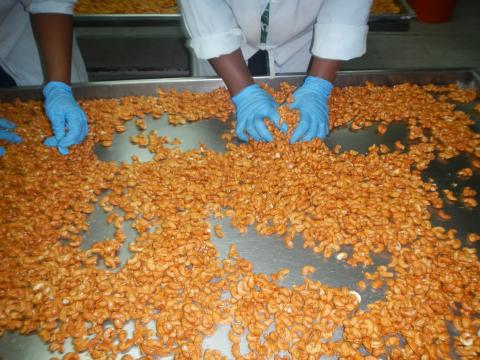Country Highlight: Kenya Distinguished for Stellar Processing Capacity
Despite an East Africa-wide fall in 2014 cashew harvests caused by poor rainfall, the Kenyan cashew industry continues to make major strides, and the decade-long sectoral slump of the 2000s is now little more than a distant memory. The past five years have seen a consistent trend of expanding cashew processing, increasing global competitiveness, and the alleviation of poverty through job creation and income generation in rural communities.
The new era of Kenyan cashew production began in 2009, with a government ban on the export of raw nuts from Kenya: this ensured that all, or at least the vast majority, of Kenyan cashews are now processed in-country. 2010 saw the beginning of the industry’s engagement with the African Cashew Alliance, and the foundation of the Nut Processors Association of Kenya (NutPak), a major industry platform and voice for nut processors, and a link between donor agencies, government ministries, value chain development organizations, research organizations, market development agencies, NGOs, and other actors related to nut value chains both in Kenya and abroad. NutPak has greatly contributed to the recent renewal of the Kenyan cashew industry through close partnership with the ACA.
Traditionally, Kenya has faced many constraints that restricted the potential of its cashew sector. On the production side, the growers must deal with biological concerns such as tree diseases, harmful pests, and overcrowding of the tree populations. There are also socio-economic constraints: most cashew farmers typically have trouble purchasing inputs or gaining access to credit due to prohibitively high interest rates and collateral requirements. Furthermore, the lack of farmer organizations and groups, and the weak linkages between researchers, extension personnel and farmers limits the opportunities for knowledge and technology transfer.
The true strength of the Kenyan cashew sector is now in its processing facilities. Five years ago, Kenyan processors were processing around 5-6000 MT per year; now, the industry typically processes over 10,000 MT, and has the operating capacity to process around twice this amount. This component of the cashew value chain nevertheless still wrestles with obstacles including insufficient supply and poor quality of raw nuts, high costs of inputs to establish and maintain processing plants, and reliance on foreign equipment.

The Kenya Agricultural Research Institute (KARI), a research center dedicated to addressing agricultural limitations and identifying ways to overcome these constraints, has recently invested great effort and funding in the cashew industry, disseminating research-based solutions to stimulate widespread adoption of effective and relevant technologies.
Cashew processor Jungle Cashews was the first company in Kenya to engage with ACA, in 2010. Now an ACA Seal-certified organization with an installed processing capacity of 30,000 MT, Jungle Nuts is a model of how businesses can work together with the ACA to strengthen the cashew sector all across Africa. When Jungle Nuts was planning its first processing plant, the ACA arranged for the firm’s management to visit a similar factory in Cote d’Ivoire and study its techniques. Now, it is Jungle Nuts which is providing the business lessons to other aspiring processors: in the past year the firm has welcomed business delegations from as far afield as Nigeria, seeking to study their success.
Kenya-based Equatorial Nut Processors Ltd. (ENP) has made particularly spectacular progress in recent years. Originally focused on macadamia nuts at its inception in 1992, ENP has since expanded to incorporate cashews and other nuts to its operations. ENP serves as a model to other processors, boasting capacity to process 9,000 MT of Nut in Shell (NIS) at their state-of-the-art agro-processing facility. ENP became an ACA member in 2012 and became the 5th ACA Seal-approved company in September of 2013, after achieving the proper food safety and quality benchmarks. Following ACA Seal certification, ENP has also received further internationally-recognized certification in HACCP and ISO 22000.
In March 2014, ENP became a member of the ACA’s Advisory Board - the first 100% African-based organization to sit on the board giving strategic advice to the ACA’s Executive Committee and Secretariat. Elsewhere in the industry, Kenyan processor Jungle Nut also gained ACA Seal certification last year, approved in May 2013.
Through partnership with the ACA, NutPak, KARI and other major actors in the sector, the producers and processors of the Kenyan cashew industry are achieving far, far greater success than a mere decade ago, and this upward trend is expected to continue.



